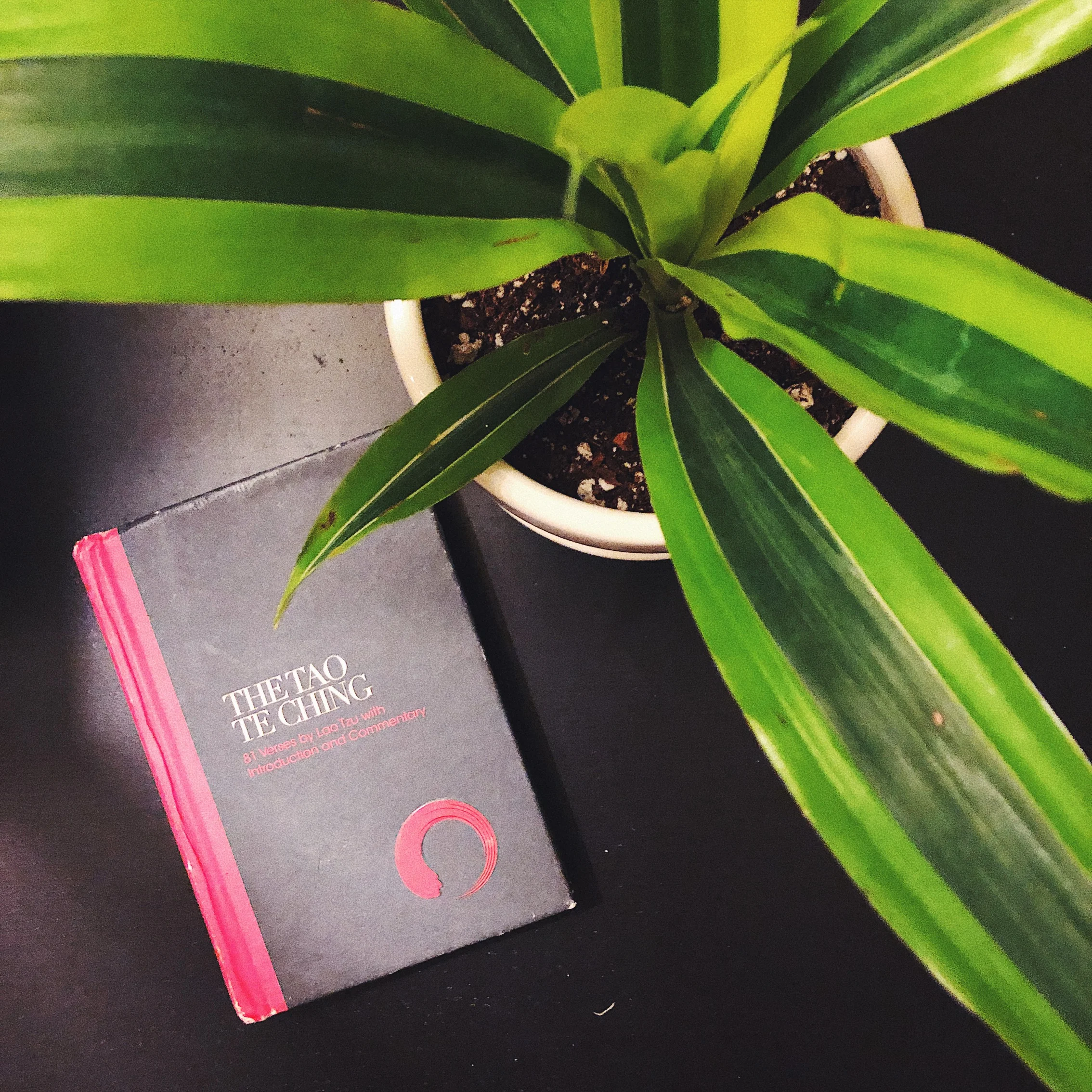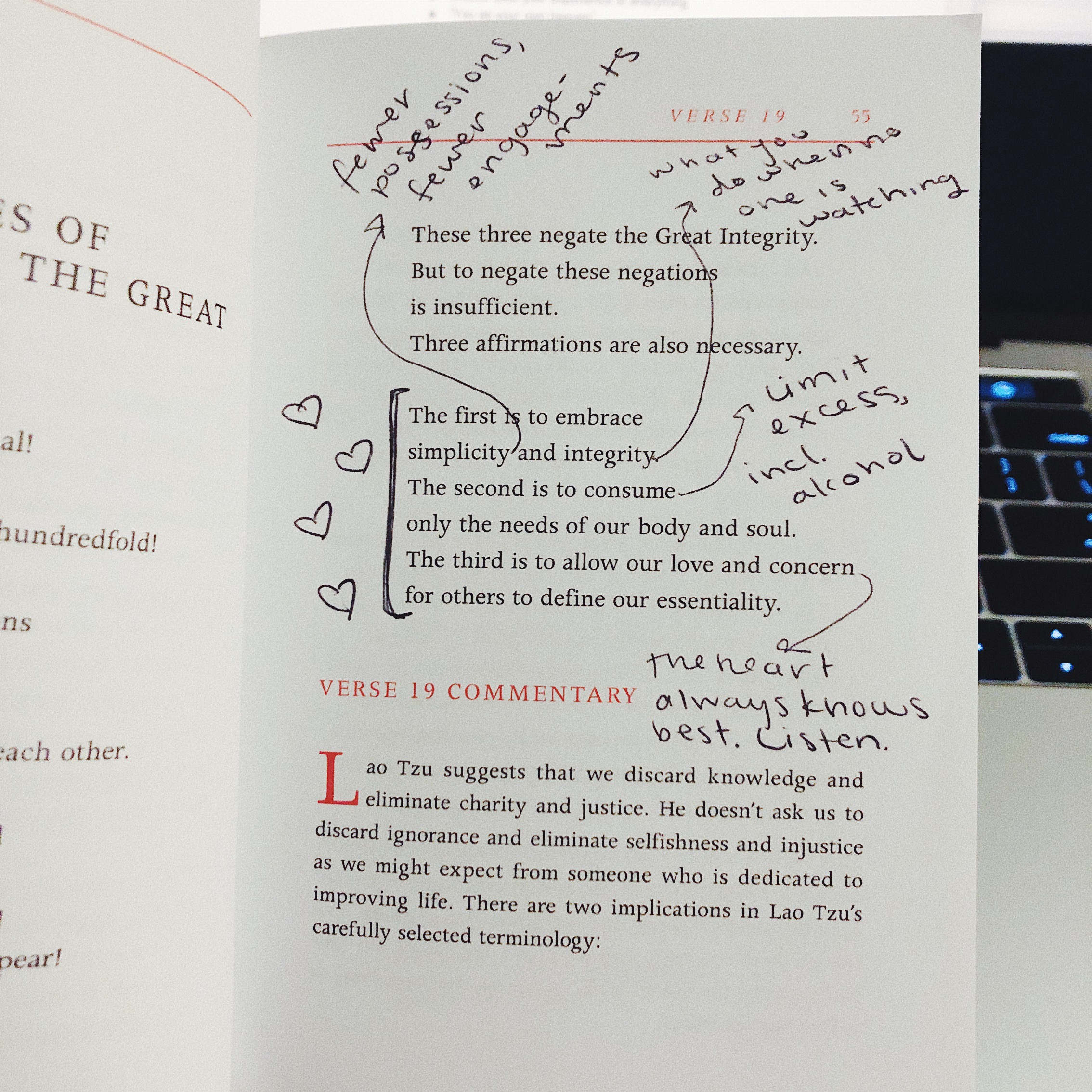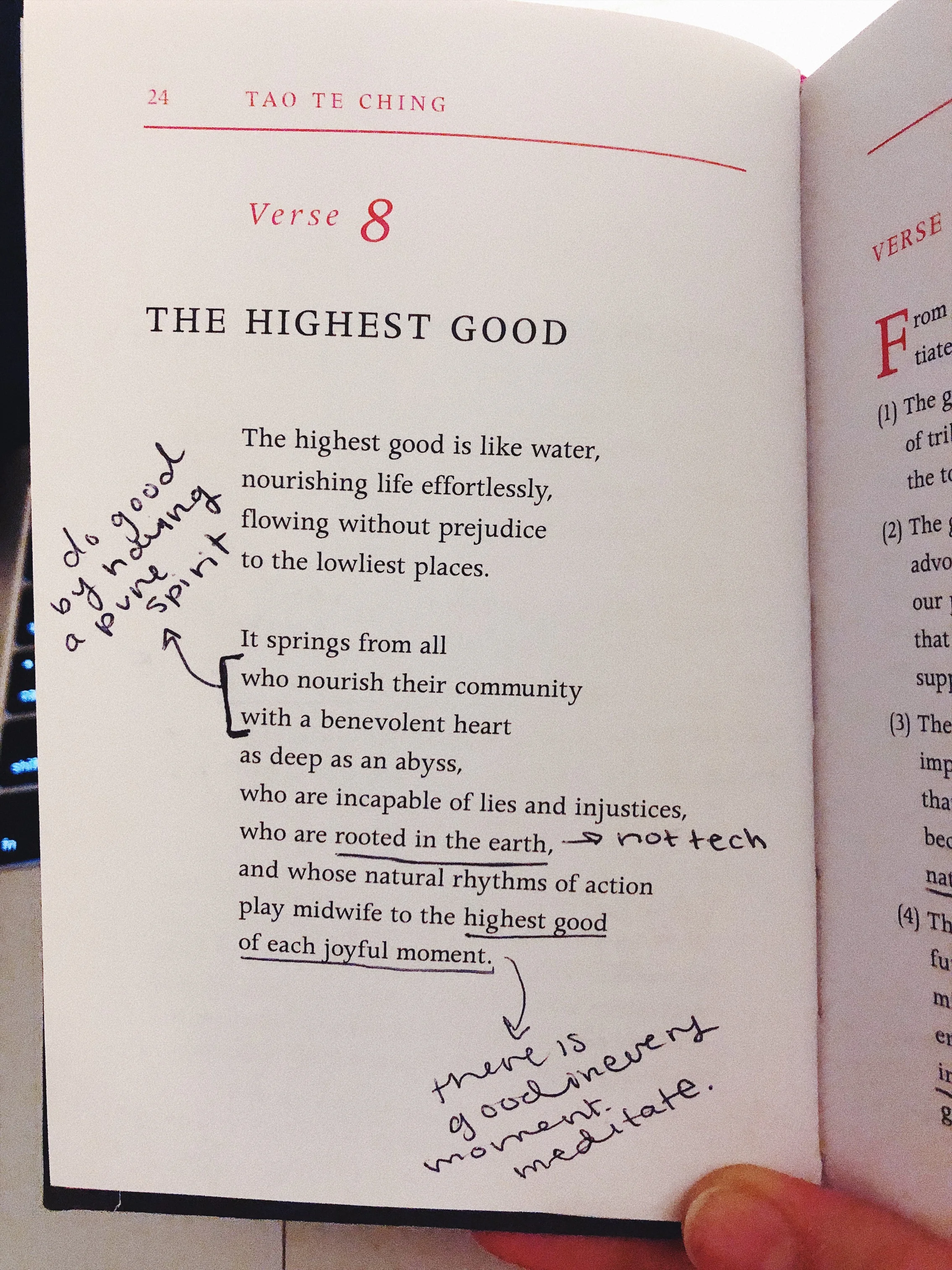The Tao Te Ching Explained: 'Transcend Tense To Fully Be Here Now'
Kevin got me a copy of the Tao Te Ching on a whim in 2017. I think he saw it on Amazon and bought with one click, but to be gifted an ancient Chinese text on existential philosophy is still a special thing. I experienced similar joy upon receipt of the mind body and soul calendar my dad got me for Christmas last year.
This book took me a full year to read, but I think the way I consumed its tiny pages was perfect. Every night that I got a chance, I would read a verse or two and annotate the pages with thoughts on how it applied to my life. It was an interactive reading model and one that I enjoy, but don’t often get to practice given my propensity for borrowed books from the library. Their staff seem less thrilled when I return the book with my very thoughtful comments penned throughout.
The Tao Te Ching explained
Although I’m not sure a review of an ancient Chinese text is the sexy content that my BSM readers are looking for, I really like to write about books as a way to integrate the learnings into my life. For its tiny size, this book felt rich with wisdom. So without further ado, here’s the Tao Te Ching explained in my own words.
Who wrote the Tao Te Ching?
Lao Tzu, widely considered to be the father of Taoism. What is Taoism, you might ask? A quick Google search reveals the following from BBC:
Taoism is an ancient tradition of philosophy and religious belief that is deeply rooted in Chinese customs and worldview.
Taoism is about the Tao. This is usually translated as “the Way.” But it's hard to say exactly what this means. The Tao is the ultimate creative principle of the universe. All things are unified and connected in the Tao.
From what I gather, Taoism is a set of spiritual beliefs related to how one should live their life. It seems closely related to zen philosophy. Here’s a bit more on the subject:
And who was this Lao Tzu?
[He] was an ancient Chinese philosopher and writer. He is the reputed author of the Tao Te Ching, the founder of philosophical Taoism, and a deity in religious Taoism and traditional Chinese religions.
From my limited internet research, there seems to be much suspicion that -- like Homer of the Odyssey or (dare I say it) Jesus of the Bible -- Lao Tzu is a mythical character and that the Tao Te Ching was likely a compilation of many authors from the time of the 6th century BC.
Despite his mythology, there are some theories about the fabled Lao Tzu’s life. It’s posited that Lao Tzu was a friend and peer of the famous Chinese philosopher Confucius. You might know Confucius for such sage quotes such as “Life is really simple, but we insist on making it complicated," or “Choose a job you love, and you will never have to work a day in your life." Many stories claim that Confucius sought out Lao Tzu’s advice from a young age and was deeply impressed with the older man’s wisdom.
The Tao Te Ching explained
In Chinese, “tao” means “path,” “te” means “virtue,” “ching” means “ancient text.” So this book is an ancient Chinese text that lays out the path to virtue (in the eyes of the likely mythical Lao Tzu). It reads something like the Bible from an ideas perspective, but with a definite zen/anti-establishment lean. Despite being contrarian for its time, it leaves the reader with a calm, soothed feeling, not agitation.
The entire book is about achieving what Lao Tzu calls “The Great Integrity,” a global society in which we’re governed by strong morals oriented toward humanity, rather than capitalism. It gets vaguely political, which might be unexpected for some.
What I liked about it was that it’s primary call to action was around connecting with our roots in nature and communal groups of humans. Over and over again, it returned to the idea that people and humanity are largely good, which is an incredibly soothing idea in a world saturated with negative media coverage and widely divergent political groups.
Lao Tzu makes the case that, over time, society has been trained to believe that injustices and cruelties are simply part of our nature, which rationalizes why we must compete so fiercely for resources. Instead, he argues that human nature is fundamentally good, and that goodness begets goodness.
An example of my interactive reading model, as well as the layout of the verses and commentary
Thematically, the Tao Te Ching trends positive. The prose is rich with words like cooperation, altruism, nature, self-actualization, humanity, transcendence, the universe, tranquility, and oneness. Right up my alley.
Notably, it also gets into some interesting topics on the nature of reality, the ego, fragmentation of society and self, as well as our relationship with excess. These are all areas of struggle for me and therefore powerful concepts to explore through philosophy.
Read the Tao Te Ching if you like…
Zen Mind, Beginner’s Mind
Rumi’s poetry
Writing quality and style
There are ~80 short verses in the book, perfect for beginning or ending your day with a sprinkle of mindfulness. The verses read like short poems and have been translated into simple, understandable prose.
The version I read includes commentary after each verse, helping make the ancient wisdom a bit more accessible. However, as a writer, I couldn’t help but read some of the commentator’s interpretations as somewhat vague and idealistic. He didn’t always do a good job surfacing the “so what” of each verse. Perhaps, though, some of the verses don’t have enough hidden meaning to surface anything more.
I think I started to annotate this book because the commentary didn’t always ring true for me, and I wanted to write in my own meaning wherever it came up. Reading is such a personal process, I would recommend this practice to anyone.
Useful stuff I learned from the Tao Te Ching
Something I’ve learned about myself through writing is that I’m far more comfortable sharing quotes from other people and commenting on them than I am producing “quotes” of my own. I’m sure this is a common feeling for many novice writers and also a symptom of digital remix culture, where it’s easy to borrow and build on ideas of another. Hopefully, you guys don’t mind.
Here’s my interpretation of some of the more powerful quotes I found in the Tao Te Ching:
“Craving the desirable loses contentment. The natural person desires without craving and acts without excess. By not doing, everything is done.”
When our talents are not appreciated, we endlessly seek affirmation. I encourage you to examine your cravings. Understand that cravings do not need to control you, because it’s not natural to be ruled by them. Be curious about your cravings and ask why you desire the things you do so strongly. Can you look for balance?
This quote seems to suggest that we strive for a life lived through the “natural expression of needs,” rather than “compensation for our deprivations.” To me, natural needs follow Maslow’s hierarchy (below). This quote is a really good reminder for me with my blog. I don’t need to seek accolades or record page views, just an internal feeling of accomplishment and creative expression.
“The wise are heard through their silence. Always self-full through selflessness.”
This quote makes me think of quiet confidence, which is a trait I so admire in others. It also seems to say: we want for nothing when we care for others. It’s interesting to turn this idea over in my head, that modesty might in fact help someone achieve self-fulfillment. I didn’t grow up valuing modesty, but as I learn and grow, the trait takes on a subtle glow. Selfless people are universally admirable and alluring in many respects.
“Because they do not delight in boasting, they are appreciated.”
When you boast or show off, it signals that you feel unloved. Most normal people (save manipulative ex-boyfriends and predatory salespeople) are repelled by obvious signs of such neediness. Instead, it’s important to keep in mind that hard work from a pure heart does not go unnoticed. I’ve been asking myself lately, how can I quietly help others?
“Transcend tense to fully be here now”
What a beautiful, lyrical way to remind myself to come into the present moment. The Tao Te Ching hails meditation as a way to cleanse the mind of daily, petty worries, so that it can be filled with more holistic, human content. “Our root is quietude,” says Lao Tzu. Return to it regularly, daily.
“You as your own heaven”
This phrase moves me, almost to tears. My heart aches for the fact that so many of us, most of us, do not love ourselves with conviction. It’s interesting to ponder why we as a society entrust so much of our energy to religious ideologies that may or may not be completely baseless, but struggle to invest in our relationship with our physical, surely-real selves.
I’m emotional as I think about what my own heaven looks like, my own reprieve from the world. If my internal environment could become that soft, warm, light-filled place, I would never need to escape anything ever again. This is what I might call a resonant phrase.
More interactive note-taking on our relationship to tech, purity of intent and meditation.
“When you merge with the universe, the whole world is attracted to you, discovering through you, its own security, peace, and good health . . . The world’s rhythms are our rhythms. To treat our planet with care, moderation and love is to be in synchrony with ourselves.”
One of the central themes in the Tao Te Ching is that there are three key human illusions:
We are separate from the Earth
The Earth is here for us
We are separate from each other
This quote offers a remedy to these dangerous illusions, illusions that have brought us to the edge of global demise by irreversible climate change. This blog isn’t really meant to be about my political beliefs, but it seems fitting to bring up in the context of a semi-political text of ancient Chinese philosophy. Even Lao Tzu understood that there would be a price to pay for our illusions of separateness.
So if we aren’t meant to be separate, what does it mean to merge with the universe? I don’t exactly know. But I think it’s an idea to be understood intuitively, not logically. Surely it’s rooted in the concept of oneness and finding serenity in your place as one of many, simultaneously everything and nothing. And if we are one with the universe, then we must take care of its contents (Earth, animals, humans) as we would care for ourselves.
Other good Tao Te Ching reviews
Understanding the Tao Te Ching (Center Tao)
The Tao Te Ching by Laozi: ancient wisdom for modern times (The Gaurdian)
Analysis of the Tao Te Ching, with Connections to Other Traditions (Medium)
Classic Review: Tao Te Ching (Kansas City Public Library!)
Find your own virtuous path
Check out the Tao Te Ching from your local library or buy it on Amazon if you want to mark it up like I did. Put it on your nightstand and flip through a few verses in the morning or evening. It’s very nice to pair with your regular meditation practice.
Even if you don’t read this book, find something that you can return to regularly in order to reflect on your world, both internal and external. What I love about books like the Tao Te Ching is not that they’re page-turners, but that they offer unique perspective that both comforts and challenges. The words are like getting a loving intervention from your very caring mother: I love you, and I want you to be happy, so here’s what I think you should think about. That’s my invitation to you.
Up Next: Read Want To Be 10% Happier? Author Dan Harris Thinks He Has The Secret




